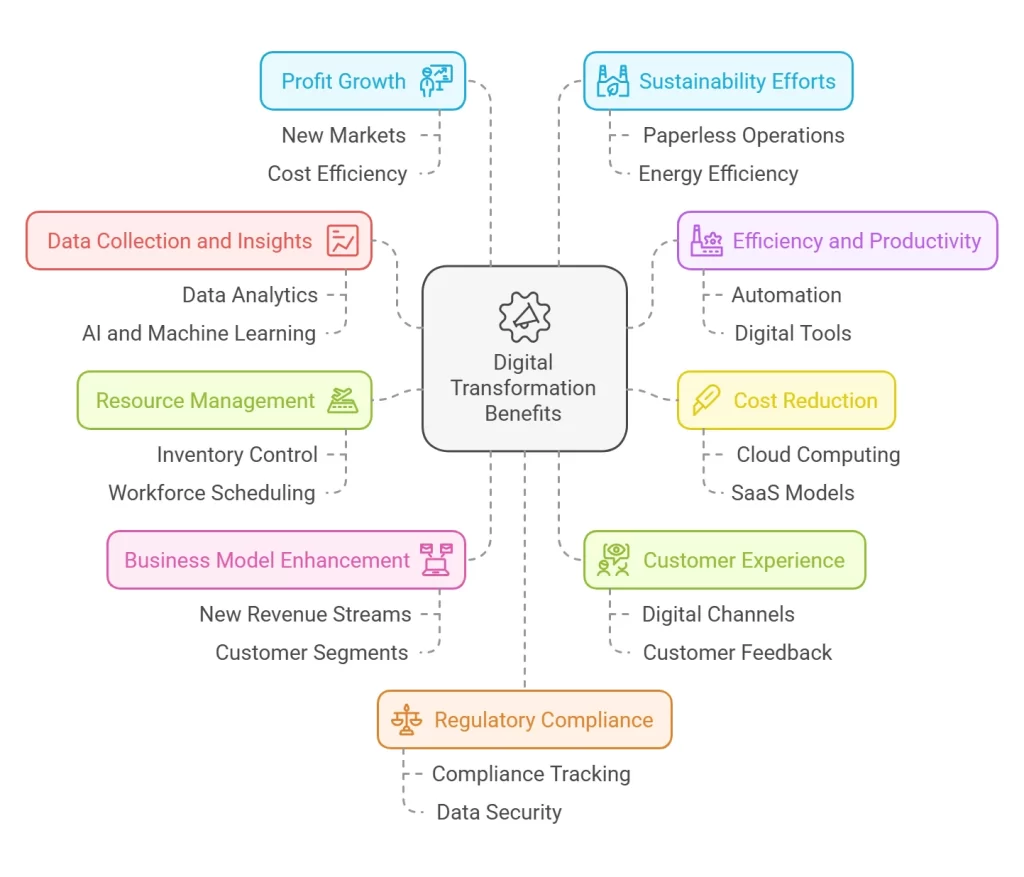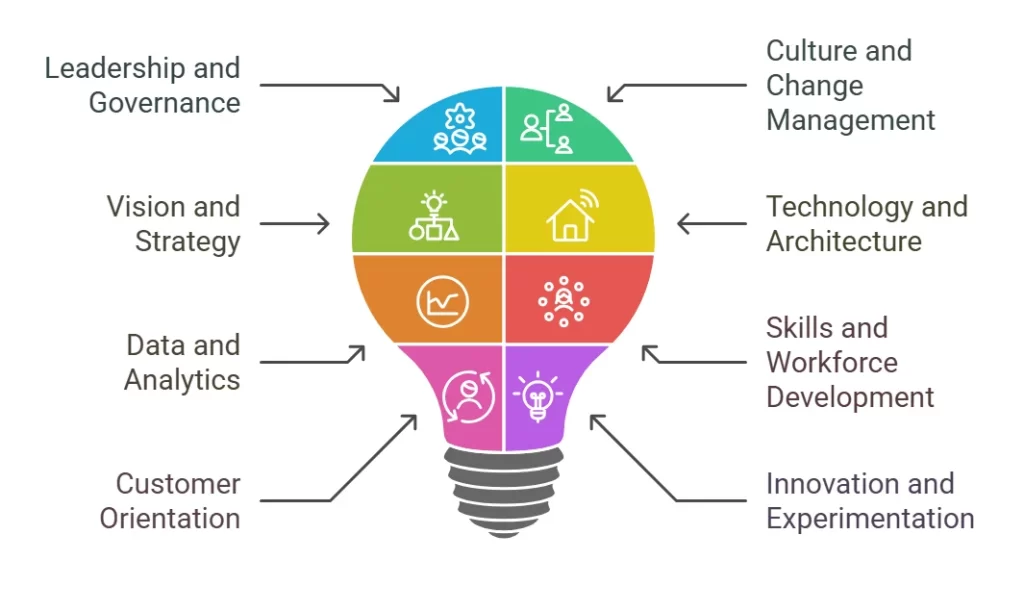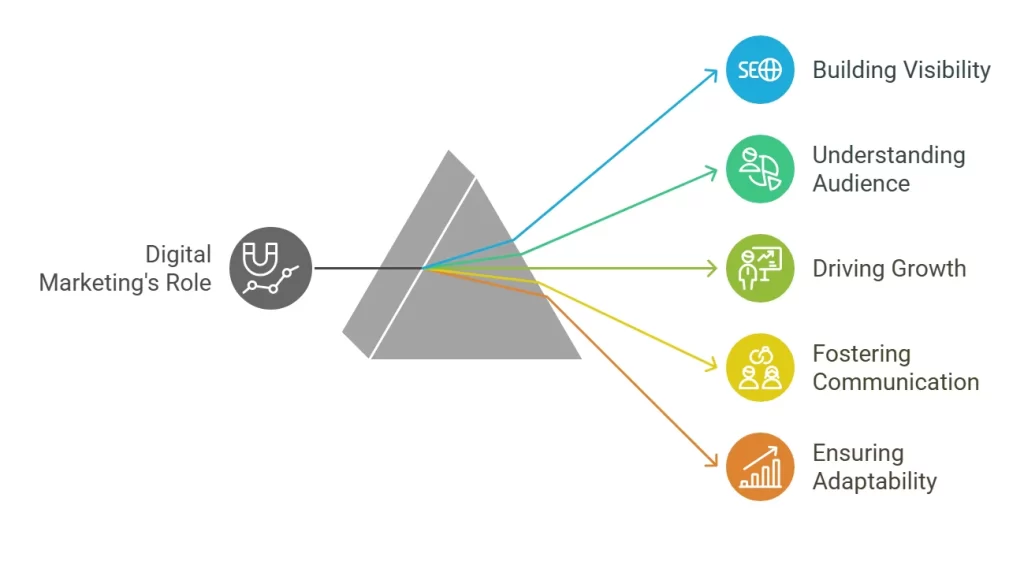With continuous advancements in technology, consumer behaviour has significantly changed.
93% of online interactions begin on search engines.
Needless to say, those businesses who miss the chance to make necessary changes to their operations would not just be rejected by customers but may also not survive the competition.
Digital transformation is the solution that allows companies to find victory in the digital era.
Studies have proven that businesses going through effective digital transformations have a higher chance of generating revenue than those not involved in digital strategies.
Digital transformation spans from improving operations to customer experience and sustainability.
In the digital-first era, it is a means of staying ahead of the competition in terms of growth and development.
As organisations are faced with the complexities of digitalization they need to comprehend its critical components and effects.
This article will cover digital transformation and discuss its key components and transformation capacity thus helping enterprises to fully comprehend it.
What is Digital Transformation?

Digital transformation is a strategic operation that utilises digital technology to change how businesses operate, communicate with customers, and deliver value to them.
This paradigm shift encompasses remodelling business models, adopting agility, and adding a digital-first perspective across the company.
It is used by businesses to create a brand and maintain a leading position in a digital-centric environment.
Digital transformation comprises several technologies including artificial intelligence, big data analytics, cloud computing, and automation.
These technologies empower businesses to optimise processes, improve decision-making, and open new possibilities for organisations to enhance growth and innovation.
A business undergoes full digital transformation when digital tools, procedures, and strategies are adapted throughout the organisation from the internal processes to the external customer interaction.
But we have to remember that digital transformation goes beyond mere technology adoption and requires a cultural shift as well as adapting an attitude of development.
Top 15 Benefits of Digital Transformation for Businesses
As businesses endeavour to prosper in the age of digitalisation, the adoption of digital transformation becomes mandatory.
By becoming fully digitised, businesses can use cutting-edge technologies, deliver improved customer experience and face competition.
Let’s look at the top 15 benefits of digital transformation for businesses:

1. Detailed Data Collection and Insights
In the digital culture, enterprises face massive amounts of data daily.
Data is generated from multiple sources, including customer interaction, transactions, and operational processes.
Innovations like data analytics, artificial intelligence and machine learning enable companies to use digitally collected information for various purposes, from summarising to deriving and implementing actionable solutions.
By understanding consumer behaviour, market processes, and operational performance, businesses can make smart decisions for personalisation, process optimisation, and innovation.
2. Improved Efficiency and Productivity
In the digital world, it is always possible to find a tool or technology that would make work easier and quicker.
For instance, instead of undertaking routine procedures such as filing forms physically, organisations can use various digital tools.
This streamlines the business operations and ensures that employees can concentrate on other significant affairs.
3. Quality Improvements
Businesses can take advantage of technology to have more effective processes like automation and quality control.
On the other hand, digital platforms also help businesses collect real-time feedback from customers, which means issues are resolved quickly.
Client feedback also facilitates the monitoring and analysis of product efficiency, which allows companies to make informed decisions on quality issues.
4. Reduced Costs
One of the greatest advantages of digital transformation is its ability to enormously reduce the operational cost of businesses while being committed to efficiency and competitiveness.
For example, digital transactions help businesses to simplify processes and cut out inefficiencies.
Another example would be the application of cloud computing and the software-as-a-service model (SaaS), leading to a reduction in expenses that resulted from only on-premises solutions.
5. Improved Management of Resources
Digital transformation comes as a gift for businesses that don’t want to compromise on resource management.
Among the latest technologies, process automation helps in resource-related processes like inventory control, workforce scheduling, and asset tracking, etc.
These procedures are transformed into online platforms to prevent manual errors and increase productivity.
Thus, digital transformation brings in an efficient resource management method that allows businesses to reduce wasted resources and achieve a higher resource utilisation rate.
6. Better Business Model
Digital transformation brings the benefit of refining business models, which is crucial for adapting to the changing digital landscape.
By embracing digital technologies, businesses can explore new revenue streams, markets, and customer segments.
For instance, companies can transition from traditional brick-and-mortar models to online platforms, expanding their reach and accessibility.
Additionally, digital tools enable businesses to gather and analyze data, allowing for better understanding of customer needs and preferences.
This insight can inform strategic decisions, leading to the development of more customer-centric business models.
Ultimately, digital transformation empowers businesses to innovate and evolve, ensuring long-term sustainability and competitiveness in the digital age.
7. Enhanced Customer Experience
Digital transformation creates better customer experiences by providing services that match their specific needs.
Digital channels like the WhatsApp API help businesses stay in constant touch with customers anywhere in the world.
For instance, websites and mobile applications unify shoppers looking for goods and services minus the stress, making the shopping experience more convenient.
By doing this, businesses encourage customers to become truly involved and loyal, resulting in a high level of customer retention.
8. Profit Growth
Profits grow with the penetration of new revenue channels, decrease in operational costs, and efficiency management.
For example, through the use of digital technology like online channels or e-commerce platforms, businesses can seize new markets.
Furthermore, automating processes also cut labour costs adding to the profits.
9. Contribute to Sustainability Efforts
The main benefit from digitisation is the fact that it gives opportunities to eliminate paper usage by replacing documents with electronic files.
Besides, digital technologies allow off-site work, decreasing commutes, eliminating office space, and to some extent reducing greenhouse emissions and energy consumption.
Moreover, businesses can introduce energy-efficient tools like smart energy management systems.
Thus, digital transformation allows businesses to engage in sustainability activities and minimise their ecological footprint for a greener future.
10. Complying with Regulations
With the help of digitalisation, companies can make all compliance tracking and reporting requirements available in a centralised system.
This significantly eliminates manual errors and reduces time spent on administration.
Digital tools not only enable continual tracking of regulations, but they also adapt to the new requirements.
Digital conversion also strengthens security systems by keeping confidential data safe from data breaches.
Through the adoption of digital transformation, businesses have the opportunity to reduce compliance risks, preventing penalties and preserving the faith of consumers and stakeholders.
11. Increased Agility
Digital technology tools are an organisation’s gateway to optimising processes, automating tasks, and making quick decisions across their businesses based on data-driven insights.
Businesses can react to changing circumstances quickly, allowing them to change their strategies or operations based on changing circumstances.
Digital tools encourage collaboration across teams and departments of an organisation encouraging fast decisions.
Through digital transformation, enterprises can begin to innovate, developing an advantageous edge in competitive and rapidly changing economic environments.
12. Improved Collaboration and Communication
Thanks to different digital tools ranging from email to instant messaging and project management applications, team members can easily communicate and work together no matter where they are located.
Businesses benefit from fast decision-making, encrypted data sharing, and seamless project coordination.
Barriers to communication and collaboration can be broken so that the best expertise in the teams can be utilised for innovation and success.
13. Enhanced Risk Management
Digital transformation brings the benefit of enhanced risk management by providing businesses with tools and technologies to identify, assess, and mitigate risks effectively.
Through digital platforms and analytics tools, organizations can gather and analyze data from various sources to identify potential risks and vulnerabilities.
This proactive approach enables businesses to anticipate and prepare for potential threats, such as cybersecurity breaches or market fluctuations.
Additionally, digital transformation facilitates real-time monitoring and alerts, allowing businesses to respond promptly to emerging risks.
By leveraging digital technologies, businesses can strengthen their risk management strategies, protect assets, and safeguard their reputation in an increasingly complex and interconnected environment.
14. Streamlined Supply Chain Management
Digital transformation facilitates streamlined supply chain management by leveraging digital technologies to optimize and integrate processes across the supply chain.
Through digitalization, businesses can enhance visibility and transparency throughout the supply chain, from sourcing and production to distribution and delivery.
This enables better tracking of inventory levels, shipments, and supplier performance, reducing delays and inefficiencies.
Additionally, digital tools such as supply chain management software and IoT sensors enable real-time monitoring of goods in transit, allowing for proactive management of logistics and inventory.
By streamlining supply chain management, businesses can reduce costs, improve responsiveness, and enhance customer satisfaction, ultimately driving competitive advantage and profitability.
15. Personalised Marketing and Advertising
Digital transformation empowers personalised marketing and advertising through data-driven digital technologies.
With platforms and analytics tools, firms can gather relevant information about customers, including demographics, purchase history, and online behaviour.
This knowledge will help in developing customised marketing campaigns and messages that will appeal to individual customers.
Besides that, digital channels like emails, social networks, and online advertising platforms, make it possible for companies to personalise the content and create offers in real time.
With this approach, organisations can spike engagement, boost conversion rates, and build a sustainable connection with clients.
Why is Digital Transformation Important for Businesses?

Digital transformation is crucial for businesses in today’s world for several key reasons:
1. Customer Demands
The relationship between consumers and business establishments has evolved.
They demand seamless user experience, optimised websites, and personalised communication.
Digitalisation helps companies to meet these challenges and keep pace with the changes.
2. Evolving Landscape
It is hard to find a field which is not evolving or using new tools and trends.
Companies that do not keep up will find themselves losing to opponents who use these innovations to make their processes more effective, attract more customers, and provide better value overall.
3. Data-Driven Decisions
We live in an age where information is the most valuable asset.
Digitalisation enables the observation and usage of customers’ information and data for improving operations.
4. Increased Efficiency and Productivity
Digital technologies may help to standardise workflows, automate repetitive tasks and enhance collaboration between different organisational units.
This conserves quite a lot of time and employees can pay attention to other crucial tasks.
This data can help in making important decisions concerning the company’s strategies, customising products, or enhancing marketing and sale options.
5. Cost Reduction
Digitalisation also means cost-effectiveness.
It involves improving productivity by eliminating paperwork, cutting costs, and utilising resources effectively to boost the business profits.
6. Global Reach
The Internet allows people to communicate with each other irrespective of geographical distances.
Digital transformation lets companies extend their product offering, enter new markets, and appeal to leads from any location.
7. Improved Brand Reputation
A strong online presence and suitable digital media marketing techniques can assist companies in creating a positive brand image, building brand awareness and gaining the trust of buyers.
Key Components of Digital Transformation
In the world of digital transformation, certain key components help lay a strong foundation for navigating the digital landscape successfully.
Let us look at some of these components:

1. Leadership and Governance
Strong leadership is vital in digital transformation for facilitating and advocating digital change.
A successful governance system is typically responsible for the monitoring, distribution of resources, and risk management.
Similarly, leadership needs to facilitate a culture of innovation and agility where they allow experimentation and learning from failures.
Implementing these habits makes the organisation more flexible and resilient while allowing space for constant improvement.
2. Culture and Change Management
A successful digital transformation process is built on cultural transformations and effective change management strategies.
These can help employees to clearly understand, accept change, and reskill themselves according to the new digital working environment.
3. Vision and Strategy
To ensure effectiveness in digital transformation, it is crucial to have a clear vision and a sound strategy.
The vision should define what the business wants to achieve in the future once the change has been implemented, whereas the strategy should identify how the vision can be attained.
This implies defining the major strategic targets and objectives for the transformation as well as the strategic activities or projects to be implemented to attain these objectives.
4. Technology and Architecture
The right technology and architecture are essential for enabling digital transformation initiatives.
This may include investments in new technologies such as cloud computing, artificial intelligence, and big data analytics, as well as upgrades to existing infrastructure.
5. Data and Analytics
Data is the backbone of digital transformation as it helps to make intelligent decisions and improve processes.
Crucial decisions are taken using machine learning models to evaluate historical and up-to-date datasets.
A well-defined data management strategy is a vital part of the transformation and involves aspects like data classification, access control, and governance.
Proper data governance places data as an asset in the organisation and prevents unauthorised access.
6. Skills and Workforce Development
In order for their organisation to flourish in the digital era, leaders should commit resources for strategic HR initiatives, including talent acquisition and development.
This ensures that the appropriate number of people with the required digital skills are hired.
Also, investing in their development eliminates the possibility of them failing to adapt to the emergent situation of corporate digital transformation.
7. Customer Orientation
Putting the customer at the center of everything is essential for success in the digital age.
Organizations need to develop a deep understanding of their customers’ needs and wants, and then use digital technologies to create personalized experiences that meet those needs.
8. Innovation and Experimentation
Digital transformation is a process that needs to be constantly refreshed through innovation and experimentation.
This means that organisations have to foster an environment where the workers can embrace innovation and risk-taking.
9. Security and Risk Management
Nowadays, cybersecurity is an essential issue, requiring companies to use up-to-date security measures and protect organisations against cyber threats.
The application comprises modifications of security protocols, vulnerability assessments, and staff training to limit the extent of risks.
Implementation of these measures must extend from endpoint devices to networks and cloud environments.
Moreover, adherence to regulations such as GDPR and HIPAA, must also be followed with due care.
10. Measurement and Evaluation
Progress in digital transformation necessitates monitoring performance periodically by aligning key performance indicators (KPIs) with the vision.
Some of the metrics include Customer Satisfaction(CSAT), Cost per Acquisition(CPA), Time-to-Market and Customer Lifetime Value(CLV).
Thanks to the data-driven methodology, all digital goals and objectives can be constantly adjusted and improved as necessary.
Why a Digital Marketing Strategy is Crucial for Digital Transformation?
Let’s take a look at how a digital marketing service plays a vital role in digital transformation.

1. Building Visibility and Reaching New Audiences
Businesses of all scales can reach beyond their regular customer base by using various digital marketing strategies like SEO, social media marketing, and target advertising to promote their new products and services.
All these activities create a global identity for the company.
2. Deeply Understanding Your Audience
Digital marketing tools and techniques provide valuable data on customer behavior, preferences, and online interactions.
This data, when analyzed, offers powerful insights into who your target audience is, what they need, and how they engage online.
This understanding is crucial for informing decisions throughout the digital transformation process, allowing you to tailor products, services, and marketing messages to resonate with your ideal customers.
3. Driving Growth and Measurable Results
Adaptive and sound digital marketing campaigns serve as a solid ground for the progression of digital transformation plans.
By driving targeted traffic to your website or landing pages, you can convert visitors into leads and ultimately, paying customers.
You can also get a clear overview of your results from sources like website analytics, social media insights, and marketing automation tools, which are key for the transformation process.
By tracking these metrics, you can understand the impact of your marketing efforts, identify areas for improvement, and optimize your strategy for better results.
4. Fostering Communication and Building Relationships
Digital marketing is not just about sales but involves the creation of relationships between your target market and the brand.
Through social media engagement, email marketing campaigns, and online communities, businesses can foster two-way communication with customers, address their concerns, and build trust and loyalty.
This fosters a positive brand image, which is essential for establishing a successful online presence during digital transformation.
5. Adaptability and Continuous Improvement
The digital landscape is continually evolving, so adaptability is necessary.
A solid digital marketing campaign would allow you to tweak and redesign as needed.
You can experiment by applying new approaches, measure the outcomes, and continue with the strategy that works well for you.
Conclusion
Digitalisation is a tool that enhances the capabilities of organisations and allows them to succeed in the 21st century.
It increases efficiency and productivity and improves the quality of customer experiences with the help of cutting-edge technologies and data-driven approaches, businesses can modernise at a fast pace and optimise their workflows.
Thus digital transformation services are a necessity and a logical progression towards achieving sustainable growth in today’s digital environment.
Global Media Insight is an established company, with over 24 years of experience, that provides a wide range of services related to digital transformation. As a web development, website design, and digital marketing firm, Global Media Insight guides companies through the digital maze. Our solutions aim to satisfy a company’s specific needs to achieve the maximum possible technological potential. Our dedicated staff of more than 100 professionals helps organisations achieve digital integration, ensuring that they continue to remain relevant in a changing landscape.

GMI’s Research Team is a panel of knowledgeable experts from various fields such as digital marketing, social media, and web development, all united by a common goal—to educate. We enjoy exploring everything from the latest industry trends and emerging technologies to people and demographics, both in the UAE and beyond. Through our blog posts, we share valuable insights that help businesses and marketers stay informed and prepared for the challenges and opportunities that lie ahead.









